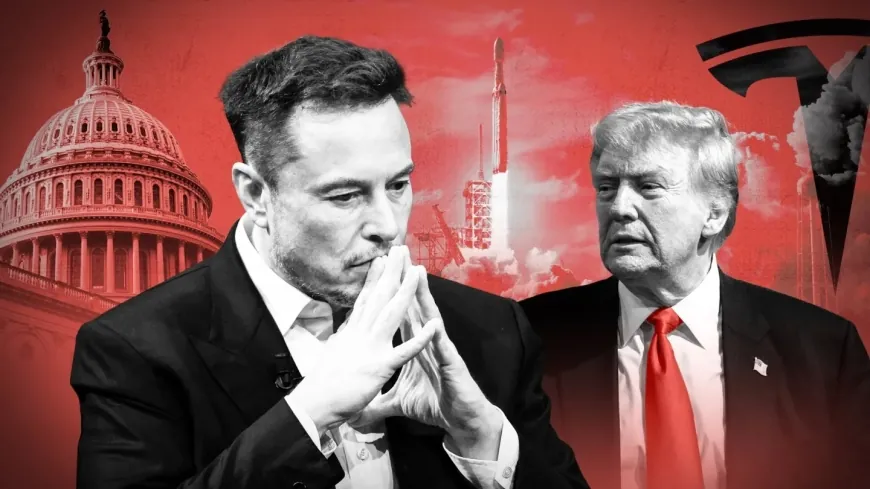Elon Musk Loses $34 Billion After Fight with Trump Hurts Tesla Stock
Elon Musk lost $34B after a public fight with Trump caused Tesla’s stock to drop. The feud began over a tax credit cut and turned personal fast.

Elon Musk, the world’s richest man, found himself in a high-stakes standoff with President Donald Trump this week—one that ended with Musk stepping back after Tesla lost a staggering $34 billion in market value.
What began as a political disagreement quickly spiraled into a personal and financial conflict. Musk, a key supporter of Trump during the 2024 campaign, turned sharply against the president over a new Republican tax bill that proposed removing a $7,500 federal tax credit for electric vehicle buyers. The policy change could potentially reduce Tesla's annual profits by around $1.2 billion, according to analysts at JPMorgan.
Angered by the move, Musk took to his social media platform X to criticize the legislation, calling it a “disgusting abomination” and urging lawmakers to vote it down. He also expressed frustration over Trump’s decision to withdraw the nomination of his associate Jared Isaacman as the next head of NASA.
This public criticism put Musk at odds with the White House. During a televised Oval Office meeting with German Chancellor Friedrich Merz, Trump made it clear he was displeased with Musk’s behavior. “I’m very disappointed in Elon,” Trump said. “I’ve helped Elon a lot. He said nice things about me, but I guess that’s over.”
Musk immediately fired back online, insisting that his financial and political support had helped Trump win the 2024 election and secure Republican control of Congress. He wrote, “Without me, Trump would have lost. The Democrats would control the House, and the Senate would be 51–49.”
The feud escalated rapidly from there. Trump claimed he had asked Musk to leave his advisory role and suggested Musk had “gone crazy” after the president scrapped a mandate requiring automakers to sell electric vehicles. Musk responded by calling Trump’s version of events “an obvious lie” and “so sad.”
As the exchange played out on social media, Tesla’s stock began to tank—at one point losing as much as 18% in a single day, the equivalent of $153 billion in market value. Wall Street took notice, and investors started to worry about the long-term impact of Musk’s very public spat with the most powerful political figure in the country.
Musk then made things worse by suggesting he might start a new political party that “actually represents the 80% in the middle,” and even responded “yes” to a user’s suggestion that Trump should be impeached and replaced by Vice President JD Vance. He went on to criticize Trump’s trade policies and claimed they could push the country into a recession.
In a particularly controversial post, Musk even suggested Trump’s name appeared in sealed files related to convicted sex offender Jeffrey Epstein. “Time to drop the really big bomb: @realDonaldTrump is in the Epstein files. That is the real reason they haven’t been made public,” Musk wrote. The White House declined to comment on the accusation.
Behind the scenes, some Trump aides reportedly tried to defuse the situation by proposing a private call between Trump and Musk, though the White House later denied that any call was scheduled. Officials claimed the idea came from Musk’s side, not the president’s.
Meanwhile, Trump remained visibly angry. A senior White House official said the president is considering returning a Tesla vehicle that was brought to a past White House event meant to show support for the company during times of protest and vandalism.
This dramatic fallout marked a sharp turn from the earlier days of their alliance. When Trump returned to office, Musk and his team of young tech advisers were welcomed into Washington, aiming to reduce government spending and shrink the federal workforce. Musk’s group, dubbed the “Department of Government Efficiency,” was tasked with finding $1 trillion in cost savings. In the end, they managed to identify only $180 billion, but the effort was seen as a serious commitment to Trump’s goals.
Just weeks ago, Musk and Trump appeared united during a press conference at the White House, with Musk expressing optimism about continuing to serve as a friend and adviser to the president. That harmony now appears to have completely unraveled.
The showdown also served as a cautionary tale for other wealthy Trump allies. It sent a clear message: even the most influential billionaire can face serious consequences when clashing with a president known for holding grudges.
As the market losses deepened and pressure mounted, Musk eventually appeared to soften his tone. In a reply to investor Bill Ackman—who urged both men to reconcile for the good of the country—Musk wrote: “You’re not wrong.”
With Musk backing down and Tesla stock beginning to recover slightly, the immediate crisis may have passed. But the damage to Musk’s business interests and his relationship with the White House could have lasting effects.
Timeline: How the Musk–Trump Alliance Broke Down
What started as a powerful political partnership between Elon Musk and Donald Trump eventually unraveled in just under a year. Here’s a step-by-step look at how their relationship evolved — and collapsed.
July 2024: Musk Endorses Trump
After an assassination attempt on Donald Trump at a rally, Elon Musk publicly pledged his support. He became one of Trump’s most visible and influential backers, both in public appearances and campaign funding.
Mid-2024: Musk Becomes Trump’s Top Campaign Donor
Musk donated hundreds of millions of dollars to pro-Trump super PACs and other GOP causes, emerging as the biggest individual donor in the 2024 election. He embraced the MAGA movement and became a high-profile figure in the campaign.
September 2024: Trump Launches ‘DOGE’ Task Force
At Musk’s suggestion, Trump created the “Department of Government Efficiency” (DOGE), aimed at slashing wasteful spending. Musk was selected to lead the task force, giving him major influence inside the federal government.
January 2025: Trump Returns to Office — Musk Takes an Active Role
Following Trump’s victory, Musk actively participated in shaping government reforms. He attended policy meetings and championed cost-cutting measures through DOGE.
Spring 2025: Signs of Friction Emerge
Musk began to clash with some of Trump’s policies, especially over tariffs and the handling of federal appointments. Tensions started to build behind the scenes, and Musk began stepping back from political involvement.
May 2025: Musk Leaves DOGE
Musk formally exited his leadership role at DOGE in late May. At the time, both sides seemed cordial, and Trump thanked Musk during a White House appearance.
Early June 2025: Public Feud Begins
The relationship soured quickly when Musk criticized Trump’s budget bill, which included eliminating a $7,500 EV tax credit — a blow to Tesla’s profits. Musk called the bill “a disgusting abomination” and urged lawmakers to vote against it.
June 4–5, 2025: Social Media Clash Escalates
Trump responded publicly, expressing disappointment. Musk fired back on social media, claiming he played a key role in Trump’s 2024 win. He even suggested starting a new political party and accused Trump of being tied to Jeffrey Epstein.
Tesla Stock Plunges
As the feud went viral, Tesla’s stock took a nosedive — falling up to 18% in a day. That drop wiped out over $150 billion in company value and slashed $34 billion from Musk’s personal net worth.
June 6, 2025: Musk Steps Back
Facing financial pressure, Musk began to ease off. He responded to allies like Bill Ackman urging peace, saying a short break was “good advice.” Trump, however, has shown no sign of forgiving or forgetting the spat.
In the end, what began as a high-profile political partnership turned into a very public feud with billions at stake. The breakdown between Musk and Trump didn’t just rattle headlines — it shook Wall Street, split political circles, and raised real questions about loyalty, influence, and the price of crossing paths at the top of power.
Also Read: CBO Warns Trump’s $3.7T Tax Cut Plan Will Increase Deficit by $2.4T
































































